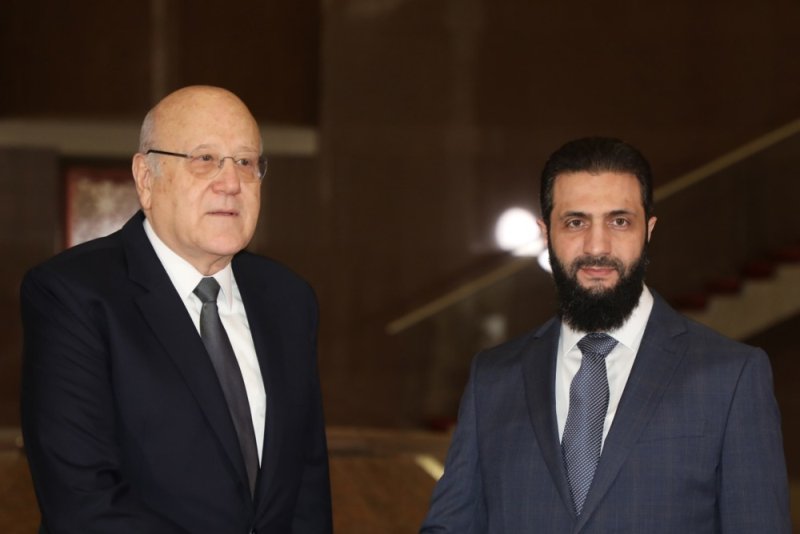Syria’s new leader Ahmad Shara met with Lebanese caretaker Prime Minister Najib Mikati in Damascus to lay “the basis for a new phase” in their relationship. Photo by Dalati Nohra/EPA-EFE
BEIRUT, Lebanon, Jan. 11 (UPI) — Syria’s new leader Ahmad Sharaa called on Lebanon Saturday to forget about the past “negative” relations resulting from decades of the Assad family’s rule, promising to resolve all lingering issues and establish long-term strategic ties.
Sharaa said today’s visit by Lebanese caretaker Prime Minister Najib Mikati to Damascus “lays the basis for a new phase” and “there will be long-term strategic ties” between the two neighboring countries which have “huge mutual interests.”
“Let’s give ourselves a chance to build a positive relationship …based on respect for both countries and their sovereignty,” he said during a joint news conference with Mikati.
He referred to the “damaged” ties under the rule of late Syrian President Hafez Assad and his son and successor Bashar Assad, who was ousted on December 8 by his Islamist rebel group Hayat Tahrir Al-Sham (HTS).
Lebanon has suffered from decades-long Syrian military presence, political domination and manipulation that greatly impacted its governance, political life, economy and stability.
The Syrian Army first entered Lebanon in 1976 to stop the then-raging civil war and remained until it was forced to pull out following the assassination of Lebanon’s former Prime Minister Rafik Hariri in a powerful explosion that targeted his convoy in Beirut on Feb. 14, 2005.
Syria imposed itself as the main power broker after having been granted guardianship over Lebanon when the civil war ended in 1990 in line with the Taef agreement, known as the National Reconciliation Accord.
It was accused of being behind Hariri’s assassination and the killings — during the civil war and in peace times — of top politicians, ministers, parliamentarians, security officials and journalists. It was also the main supporter of its once-powerful Hezbollah ally, providing support and assistance for its anti-Israel resistance.
But its influence on Lebanon began to wane rapidly since 2011, when anti-Assad peaceful protests broke out and soon turned into a bloody civil war.
Sharaa promised that new Syria will not support one Lebanese party over the other and will try to solve all problems between the two countries “through consultation and dialogue.”
Syria under Assad’s rule used to interfere in Lebanon’s political decisions and foreign policy, forcing the election of presidents, nomination of prime ministers and appointment of ministers and others in key government posts.
The Sharaa-Mikati talks focused on controlling the countries’ land borders, including illegal border crossings mainly used to smuggle arms and drugs, and delineating both land and sea borders.
Assad’s fall, which further weakened Hezbollah after it suffered heavy blows during its war with Israel, deprived the militant group of Iran’s main arms and financial supply line.
“Among the top priorities is the land and sea border demarcation that would take some time. Today we should completely control the borders, especially the illegal border crossing points to stop any smuggling,” Mikati said.
He pledged to prevent “any action that could … threaten the security” of Lebanon and Syria, emphasizing the need to consolidate joint measures on the border and announcing that a joint committee will be formed to carry out the delineation process.
Earlier this month, Syria imposed new restrictions on the entry of Lebanese citizens following a clash between Lebanese soldiers and armed Syrians over the closure of a border crossing.
Sharaa and Mikati also discussed the issue of hundreds of Lebanese who were arrested by Syria’s forces and disappeared in its jails during their nearly 30-year presence in the country.
Out of 725 counted by a special Lebanese emergency commission, only nine Lebanese prisoners returned to Lebanon after Bashar Assad’s ouster.
Mikati said Lebanon will supply the new Syrian administration with a list including the names of all Lebanese who went missing in Syrian jails.
Asked about the fate of Austin Tice, an American journalist the U.S. government says was abducted by the Syrian government 12 years ago, he said Syria’s new authorities are following up his case “with all concerns to find him alive with God’s will.”
